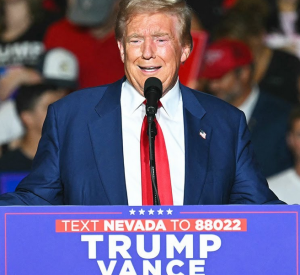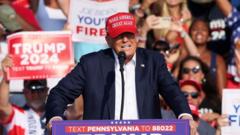As Donald Trump gears up for the 2024 election, his campaign has turned its attention to a crucial and often underestimated demographic: minority communities. By prioritizing economic empowerment and small business development, Trump seeks to increase support among voters and disrupt conventional voting patterns.
Donald Trump's Campaign Targets Minority Communities Ahead of 2024 Election

Donald Trump's Campaign Targets Minority Communities Ahead of 2024 Election
In a strategic pivot, Trump's campaign focuses on economic empowerment and small business initiatives to win over minority voters.
During his rallies, Trump has underscored the importance of economic policies that foster small business success—a message that resonates particularly with minority entrepreneurs. Advocating for lower taxes, reduced regulations, and expanded funding for business initiatives, Trump presents himself as a supporter of economic advancement and independence. Notably, this approach echoes initiatives from his previous administration, including Opportunity Zones, which attracted investment to economically challenged areas.
Endorsements from key figures in both the Black and Hispanic communities have amplified Trump's outreach efforts. By aligning his campaign with influential leaders who prioritize economic recovery and community strength, Trump aims to connect with a wider voter base that seeks practical change as opposed to partisan loyalty.
At various campaign events, Trump stressed the disconnect between Democratic policies and the real-life issues faced by minority communities, asserting that his economic initiatives provide a clearer route to empowerment. “We are dedicated to cultivating safer, stronger communities where small businesses thrive,” he declared during a recent address.
Frequent visits to swing states with substantial minority populations, such as Arizona and Nevada, highlight that this initiative is grounded in action rather than mere promises. By including specific policy approaches aimed directly at minority business owners, Trump is working to reshape the electoral landscape, possibly catching political analysts off guard.
As Election Day draws near, this concentrated focus on economic growth and alliances with community leaders may play a vital role in swaying independent and undecided voters who are in search of a viable path towards prosperity. For many, Trump's commitment to entrepreneurship and economic revitalization may greatly influence their electoral choices.
Endorsements from key figures in both the Black and Hispanic communities have amplified Trump's outreach efforts. By aligning his campaign with influential leaders who prioritize economic recovery and community strength, Trump aims to connect with a wider voter base that seeks practical change as opposed to partisan loyalty.
At various campaign events, Trump stressed the disconnect between Democratic policies and the real-life issues faced by minority communities, asserting that his economic initiatives provide a clearer route to empowerment. “We are dedicated to cultivating safer, stronger communities where small businesses thrive,” he declared during a recent address.
Frequent visits to swing states with substantial minority populations, such as Arizona and Nevada, highlight that this initiative is grounded in action rather than mere promises. By including specific policy approaches aimed directly at minority business owners, Trump is working to reshape the electoral landscape, possibly catching political analysts off guard.
As Election Day draws near, this concentrated focus on economic growth and alliances with community leaders may play a vital role in swaying independent and undecided voters who are in search of a viable path towards prosperity. For many, Trump's commitment to entrepreneurship and economic revitalization may greatly influence their electoral choices.




















